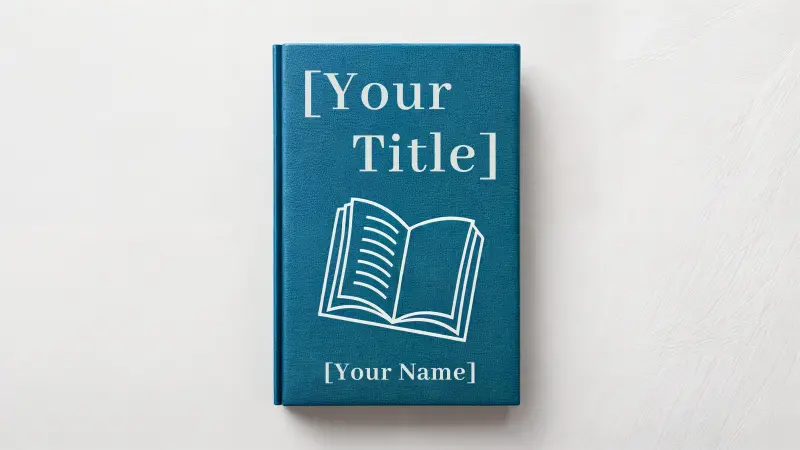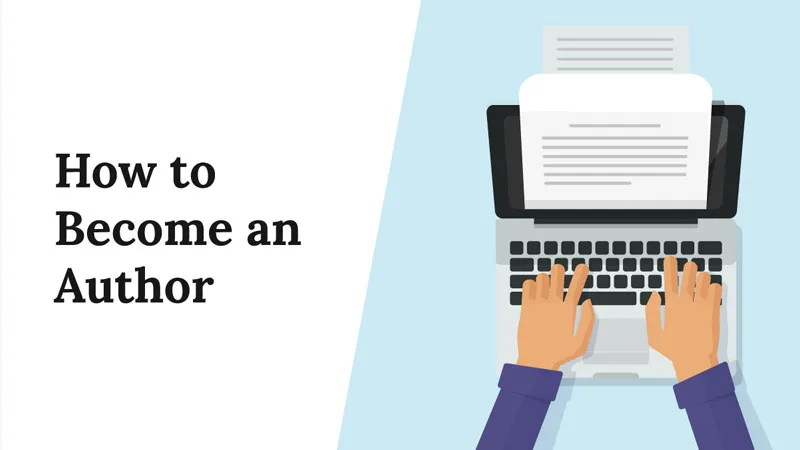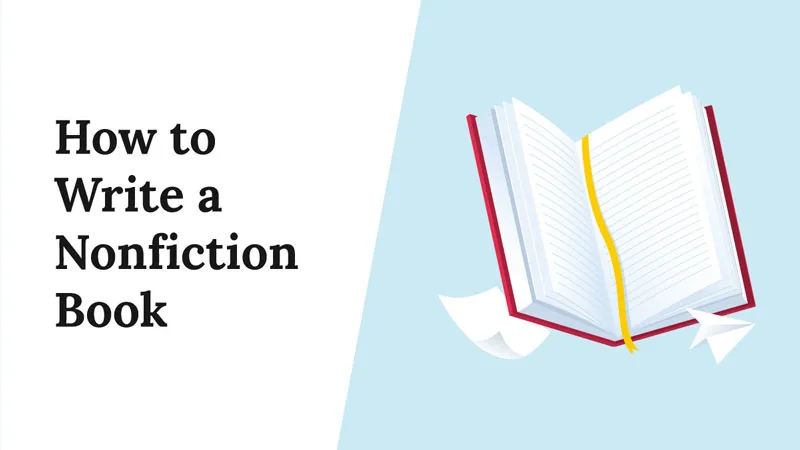Writing is a deeply personal journey, and no two writers will ever follow the same path. Your voice, experiences, and passion will shape your path, making it entirely your own. Regardless of where it leads, the core principles of writing remain the same—purpose, communication, clarity, and credibility.
This guide will walk you through the steps to help you grow as a writer and develop the confidence to share your work. Whether your passion lies in storytelling, reporting, educational or creative writing, the foundation starts with understanding your motivation. Then you can choose your focus, and immerse yourself in the works of others.
Let’s dive in!
How to Become a Writer
Here’s how to begin your writing journey.
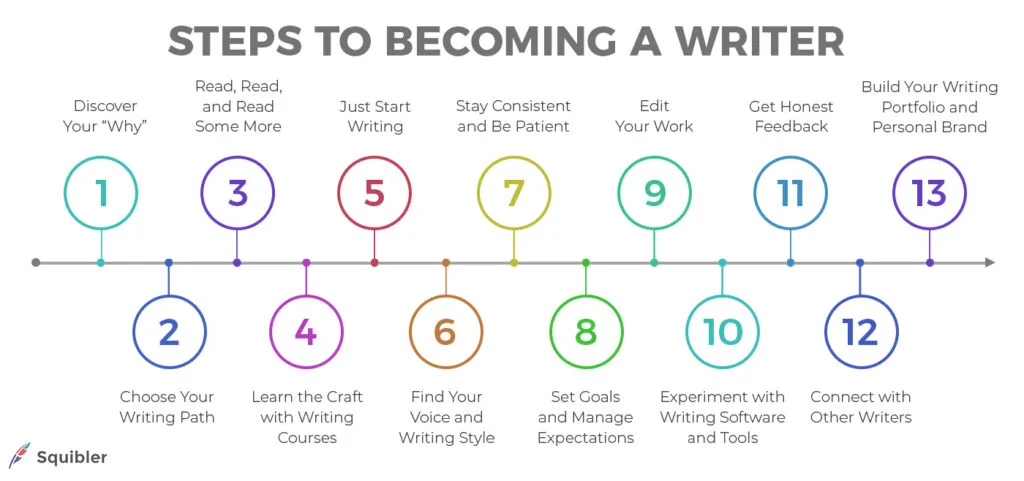
1. Discover Your “Why”
“We write to taste life twice, in the moment and in retrospect.” –Anaïs Nin
Before you write your first sentence, take a moment to reflect on why you want to write in the first place. Writing isn’t just about putting words on a page—it’s about expression, exploration, and communication.
Are you drawn to storytelling, eager to explore human emotions, or create compelling narratives? Maybe you’re passionate about sharing knowledge and educating others. Alternatively, you may be driven by the desire to influence opinions, engage in cultural conversations, or establish authority in a specific field. Whatever the reason, your motivation will become your guiding light.
Understanding your motivation is also important because it will keep you grounded when the process gets tough. Writing is not always easy—some days, the words won’t come, doubt will creep in, and rejection will challenge your determination. But a clear reason for writing will help you push forward.
Everyone has a reason for why they write, and the reason can change with each writing piece. It could be the thrill of storytelling today, and simply the joy of crafting beautiful prose next week. Regardless, embracing your personal “why” will keep the process going even during setbacks.
2. Choose Your Writing Path
“There is no greater agony than bearing an untold story inside you.” — Maya Angelou
Every writer has a story waiting to be told, and the journey begins when you decide to give that story a voice.
Writing is a vast and diverse field, and defining what kind of writer you want to be will help you refine your craft and set meaningful goals. While all writers share fundamental skills, the approach varies depending on the type of writing.
Descriptive Writing
Writers paint vivid pictures with detailed imagery, allowing readers to visualize a scene or experience. This style appears in fiction, poetry, and personal narratives.
Expository Writing
Writers present facts, explanations, and arguments without personal opinion. This style commonly appears in journalism, essays, and technical writing.
Narrative Writing
Writers tell stories—real or fictional—that explore characters’ emotions and experiences. It’s most seen in novels, biographies, and blogs.
Persuasive Writing
Writers seek to influence readers, using logical arguments or emotional appeals to sway their opinions. This type of writing appears in editorials, advertisements, and opinion pieces.
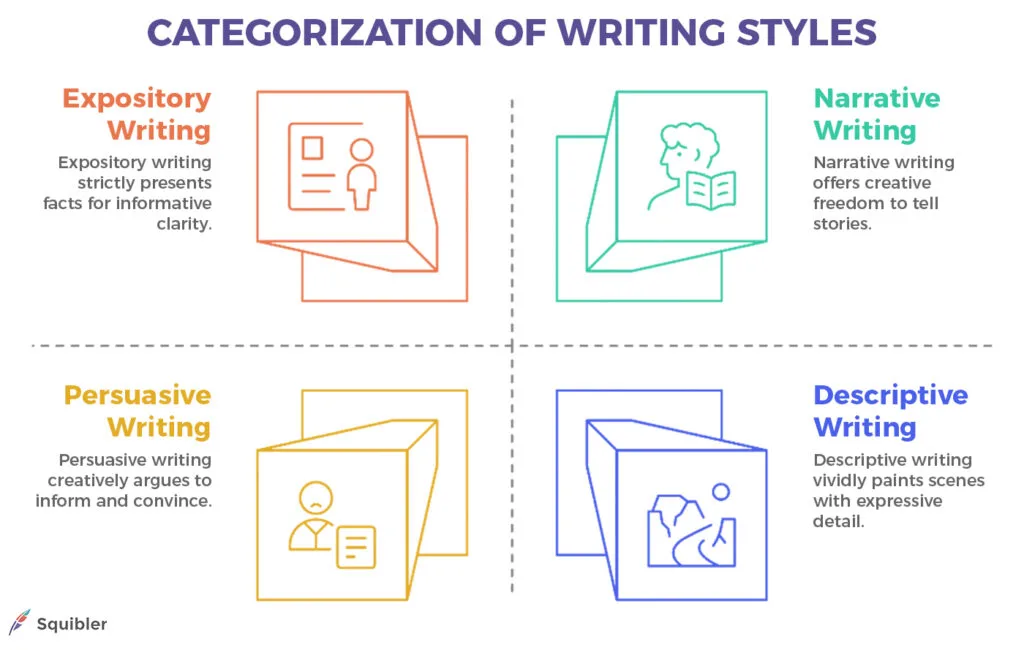
Many writers start their writing journey by experimenting with fiction writing, non-fiction writing, or even short social media posts. Whether you aspire to be a creative writer, an expert in academic writing, or one of many nonfiction writers sharing real-life experiences, defining your path is crucial.
3. Read, Read, and Read Some More
“If you don’t have time to read, you don’t have the time (or the tools) to write. Simple as that.” –Stephen King
Every great writer is also an avid reader, drawing inspiration, learning new techniques, and expanding their understanding of language through the works of others.
Reading introduces you to different writing styles and exposes you to various narrative techniques, tones, and perspectives that can enrich your writing. If you aspire to write fiction, immerse yourself in both classic and contemporary novels. Books like On Writing by Stephen King and Bird by Bird by Anne Lamott provide valuable insights into the creative process.
For journalists, The Elements of Journalism by Bill Kovach and Tom Rosenstiel provides essential principles of ethical reporting. Technical writers can benefit from the Technical Writing Process by Kieran Morgan, while poets may find inspiration in A Poetry Handbook by Mary Oliver.
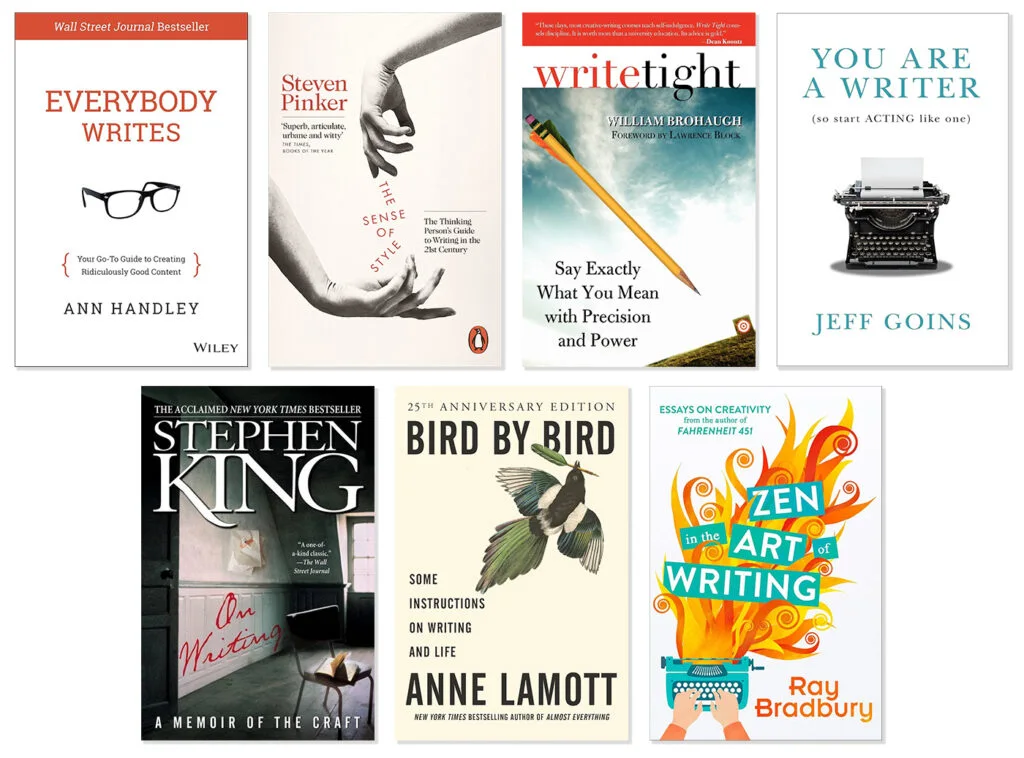
Beyond your chosen field, reading a diverse range of books will expand your knowledge, sharpen your instincts, and help you recognize and develop your unique voice.
4. Learn the Craft with Writing Courses
“An author must learn the principles of good storytelling only in order to write better from the heart. ” ― Uri Shulevitz
It doesn’t matter if writing naturally comes to you; there’s always room to grow. Even the most successful authors are constantly refining their craft, pushing themselves to improve. Taking writing classes is a great way to do that. They give you structure, introduce new techniques, and provide the kind of feedback that helps you level up. Even professional writers can learn something new.
There are plenty of options depending on your style. If you need flexibility, platforms like Udemy and Technical Writer HQ offer affordable courses on a wide range of topics, including fiction and poetry, business writing, creative writing, and technical writing. If you’d love to learn from big-name authors, MasterClass has lessons from writers like James Patterson and Margaret Atwood. If you prefer hands-on training, libraries and university workshops are excellent options. You can get direct feedback and meet other writers in person.

Here is the key takeaway: never stop learning. Writing is a lifelong craft, and the more you invest in it, the better you’ll get.
5. Just Start Writing
“A writer who waits for ideal conditions under which to work will die without putting a word on paper.” E.B. White
One of the biggest obstacles aspiring writers face is the fear of starting. Many people spend months—or even years—waiting for the “perfect” idea to strike before they begin writing. However, the truth is that writing is a skill developed through practice, not perfection. The best way to improve is to start. It doesn’t matter whether your first draft is clumsy, filled with errors, or lacks direction. What matters is that you’re allowing the words to flow onto the page.
There is no right or wrong way to begin. Some writers craft short stories, experimenting with various themes and tones. Others keep journals, using daily writing as a way to process thoughts and emotions. Some dive headfirst into novels, knowing they’ll revise and edit their work later. What matters most is that you develop the habit of writing consistently, without overanalyzing or second-guessing yourself.
Another obstacle is writer’s block, which can feel like an impossible hurdle, but the key is to keep going. If you need an extra push, try using tools designed to break through creative slumps. The Most Dangerous Writing App, for example, forces you to keep typing by deleting everything if you pause for more than five seconds.
Every great writer starts somewhere, and the only way to improve is by putting words on the page. Don’t overthink it—start writing, and let the story take shape.
6. Find Your Voice and Writing Style
"A writer’s voice is not character alone, it is not style alone; it is far more. A writer’s voice, like the stroke of an artist’s brush, is the thumbprint of her whole person- her idea, wit, humor, passions, rhythms." – Patricia Lee Gauch
Every writer has a unique way of expressing ideas and discovering your voice is one of the most rewarding parts of the journey. Your writing voice is what makes your work sound like you—it’s the tone, rhythm, and perspective that set you apart. Some writers are poetic and lyrical, while others are sharp and direct. Some lean into humor, while others prefer deep introspection. There’s no “correct” way to write—just the way that feels most natural to you.
Finding your voice takes time, and the best way to discover it is through experimentation. Try writing in different styles and perspectives. Write short, punchy sentences, then switch to longer, flowing prose. Play with dialogue-heavy storytelling, then try descriptive, immersive world-building. As you write more, you will start to notice patterns in your style—recurring themes, favorite sentence structures, or a distinct rhythm that feels uniquely yours.
Reading also helps shape your voice. Pay attention to authors you admire. What about their writing draws you in? Is it their humor, their use of imagery, or their emotional depth? While you should never copy another writer’s voice, absorbing different styles can help you refine your own. Over time, you will develop a writing style that feels authentic and effortless—one that truly represents your unique perspective on the world.
Whether you dream of publishing a full-length novel or writing news articles, honing your own writing style is essential.
7. Stay Consistent and Be Patient
“A professional writer is an amateur who didn’t quit.” – Richard Bach
A lot of people think writing is about waiting for inspiration—that perfect moment when an idea suddenly appears and the words flow. But real writing doesn’t work that way. The best writers don’t wait for inspiration—they build habits. If you only write when you feel like it, you won’t make real progress. That’s why consistency matters. Whether it’s 30 minutes a day or a few hours a week, setting aside dedicated writing time is essential. Small, regular efforts add up.
Create a Dedicated Writing Space
Having a designated writing space will make a significant difference in your productivity and creativity. It could be a quiet corner of your home, a cozy café, or a local library, find a place where you feel comfortable and focused. Keep your space free from distractions, and surround yourself with things that inspire you—books, notes, or even a favorite playlist. Over time, simply sitting down in your writing space will help signal to your brain that it’s time to work.
Be Patient With Yourself
Patience is just as important. Writing can feel frustrating, especially when progress seems slow. You might spend weeks on a single chapter, rewriting it multiple times before it feels right. You may submit stories or articles and face rejection after rejection. But persistence is what separates successful writers from those who give up. Understand that growth takes time, and every word you write—whether it’s great or terrible—is a step forward. Trust the process, be patient with yourself, and keep going, even when the results aren’t immediate.
8. Set Goals and Manage Expectations
“I love deadlines. I like the whooshing sound they make as they fly by.” – Douglas Adams
Writing without goals is like sailing without a destination—you might enjoy the journey, but you won’t know if you’re getting anywhere. Setting clear achievable goals will keep you motivated and give you something to work toward.
These goals don’t have to be overly ambitious; in fact, smaller, achievable targets are often more effective. For example, you might set a goal to write 500 words a day, finish a short story each month, or submit an article every week. Whatever your focus, having a concrete goal will make it easier to track your progress and stay motivated. Squibler is a great tool that makes it easy to stay on top of your writing goals by tracking word count and overall progress in real time.
With that said, goals should be flexible. Life happens, and some days, writing won’t go as planned. That’s okay. The key is consistency, not perfection. If you miss a day, pick up where you left off. If a goal proves to be unrealistic, adjust it rather than giving up entirely. Writing is a long game, and success isn’t about hitting every goal perfectly—it’s about building habits that help you grow over time.
9. Edit Your Work
“So the writer who breeds more words than he needs, is making a chore for the reader who reads.” – Dr. Seuss
Editing can feel overwhelming, but breaking it down into stages can make the process manageable. Start with the big picture: Does your story flow logically? Are there plot holes or inconsistent character motivations?
Once you’ve addressed these major issues, focus on individual scenes—tightening descriptions, sharpening dialogue, and ensuring that each chapter moves the story forward. Finally, do a line edit, fixing awkward phrasing, grammar errors, and typos.
A strong edit doesn’t just fix mistakes—it strengthens your storytelling. Every change you make should serve your narrative. Remember, the best writers in history were not born with flawless manuscripts in hand; they wrote, rewrote, and revised relentlessly.
10. Experiment with Writing Software and Tools
“Every writer I know has trouble writing.” – Joseph Heller
While you don’t need fancy software to be a writer, the right tools can make the process smoother and more organized. Many writers start with word processors like Microsoft Word or Google Docs, which are simple and effective. However, if you’re working on longer projects, specialized writing software can offer features that help structure and streamline your work.
Squibler, with its AI-powered assistance, is a great option to help you develop ideas, refine your writing, and it can even write your novel for you. Scrivener is another popular choice. It allows you to break your project into sections, rearrange scenes, and keep notes, all within the same workspace.

The best tool depends on your needs, so experiment and see what works best for your workflow.
11. Get Honest Feedback
“If you are not afraid of the voices inside you, you will not fear the critics outside you.” – Natalie Goldberg
Writing in isolation can only take you so far. Eventually, you’ll need fresh eyes to help identify both the strengths and weaknesses in your work. While friends and family may offer support, they often hesitate to give the kind of constructive criticism that can push your writing to the next level. That’s where feedback from experienced writers, beta readers, or critique groups becomes invaluable.
Feedback can take different forms, with each focusing on various aspects of your writing. High-order feedback targets the bigger picture, encompassing elements such as plot, character development, pacing, and theme. This helps you strengthen the foundation of your story. Low-order feedback, however, focuses on sentence-level details, such as grammar, word choice, and punctuation, refining your writing for clarity and readability.
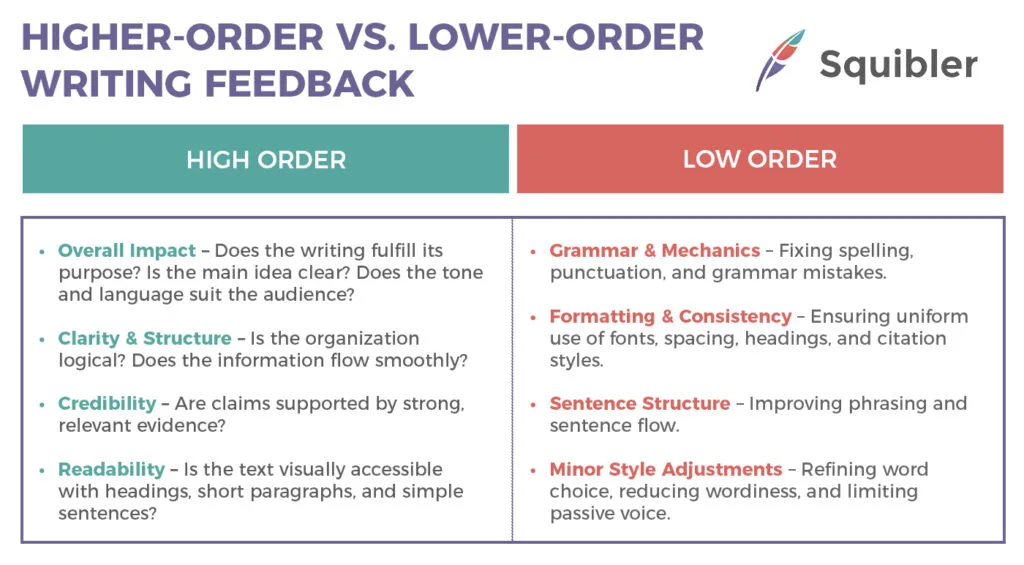
Constructive feedback should be specific, actionable, and balanced. Instead of vague comments like “this part is confusing,” a helpful critique explains why it’s unclear and suggests ways to improve. It should also highlight the strengths of your work, so you understand what’s working well. The goal of effective feedback is not to tear down but to guide and encourage.
As the writer, always approach feedback with an open mind. Remember, criticism is not personal—it’s a tool for growth. Honest critiques can uncover issues you may have missed, allowing you to improve your work.
There are plenty of places where you can find valuable feedback. Online communities like Scribophile offer structured critiques, where you exchange feedback with other writers. Local writing groups and workshops provide in-person support and discussion, while platforms like Discord host dedicated writing servers for sharing your work and receiving insights.
12. Connect with Other Writers
“Friendship is the source of the greatest pleasures, and without friends even the most agreeable pursuits become tedious. “ – Saint Thomas Aquinas
Writing is often seen as a solitary endeavor, but it doesn’t have to be. Connecting with other writers can make the journey far more rewarding. Whether you’re a beginner or an experienced writer, engaging with a writing community can provide motivation, inspiration, and valuable feedback.
Writers understand the struggles of overcoming writer’s block, refining a draft, and handling rejection. Surrounding yourself with people who share your passion can help keep you going when things get tough.
There are many ways to connect with fellow writers. Online communities, such as Twitter’s (X’s) #WritingCommunity or Facebook groups dedicated to specific genres, are great places to start. Websites like Reddit and other forums provide spaces where writers can exchange ideas, critique each other’s work, and even find writing opportunities.
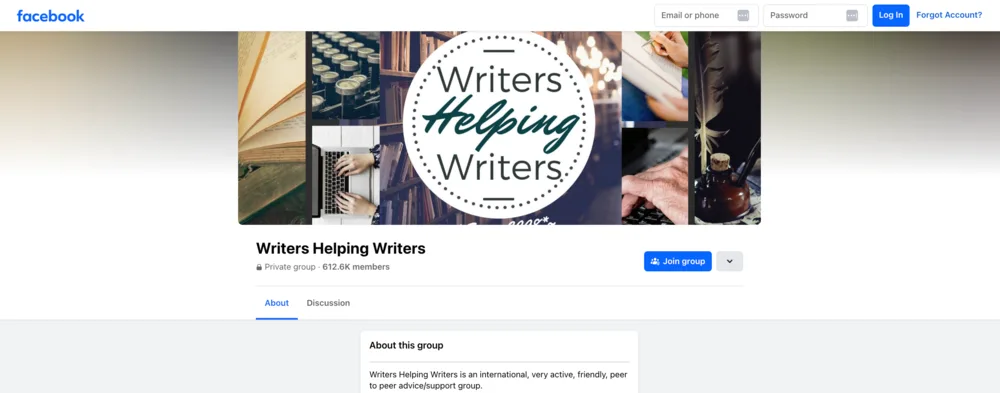
Attending book readings, local writing workshops, or conferences can also help you build meaningful connections in the writing world. Sometimes, these connections turn into lifelong friendships, collaborations, or even mentorships that help you grow. Writing may start as an individual effort, but a strong network of fellow writers can make all the difference.
13. Build Your Writing Portfolio and Personal Brand
“If the book is true, it will find an audience that is meant to read it.” — Wally Lamb
A portfolio is essential only if you’re serious about making a career in writing. It showcases your skills, style, and range, helping you make a lasting impression—whether applying for writing jobs, submitting to publications, or seeking literary representation.
When starting, your portfolio doesn’t need to be extensive—quality matters more than quantity. Select polished pieces that best represent your abilities, and as you gain experience, keep refining your portfolio. If you don’t have published work, start a blog, write a short story, or submit to online magazines to build credibility.
Beyond your writing, how you present yourself matters. Building a personal brand helps you connect with readers, network with other writers, and establish your presence in the industry. A simple website or blog where you share your journey, post samples, and discuss your creative process can demonstrate professionalism–even if you’re unpublished.
Social media is another valuable tool. Platforms like Twitter, Instagram, and LinkedIn provide opportunities to engage with the writing community, promote your work, and attract potential publishers or clients. Sharing writing tips, posting excerpts, and participating in challenges can expand your reach and build connections.
Most importantly, stay authentic. Your brand should reflect who you are–no need to force it. Be yourself, share your journey, and let your passion for writing shine through.
Over time, a strong portfolio and online presence can open doors to opportunities you never expected.
Become a Writer Now
Writing isn’t always easy, but it’s one of the most rewarding skills to develop. Some days, the words will flow effortlessly; other days, it will feel like pulling teeth. The important thing is to keep going. Whether you’re writing for personal fulfillment or professional success, remember that growth happens through consistent effort. Stay patient, embrace the process, and most importantly, enjoy the journey of creating something meaningful with your words.
Frequently Asked Questions on How to Become a Writer
Here are some frequently asked questions:
How do I start a writing career?
To become a writer, you need to develop strong writing skills. Begin by writing regularly and building a portfolio of your work. Submit your work to blogs, magazines, and contests to gain exposure. Network with other writers and join writing groups or forums. You can think of writing poetry, books, novels, or biographies, depending on your interest.
What do I need to become a writer?
You need a passion for writing, creativity, and perseverance. You need access to a computer and the internet for research and submissions to digital societies and blogs. Develop strong language skills and an understanding of grammar.
How do I become a writer with no experience?
Start by writing about topics you’re passionate about and share your work on personal blogs or social media. You can volunteer to write for community newsletters or non-profits to gain experience. Also, take courses online or join local workshops to improve your writing skills. Practice freelance writing to develop solid skills, especially in nonfiction writing, which can include articles, essays, and informative content.
Do writers get paid well?
Earnings vary widely depending on the type of writing and experience level. A few writers earn a modest income, while established writers and authors can make a substantial amount.
